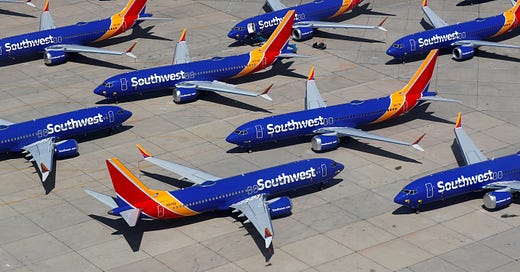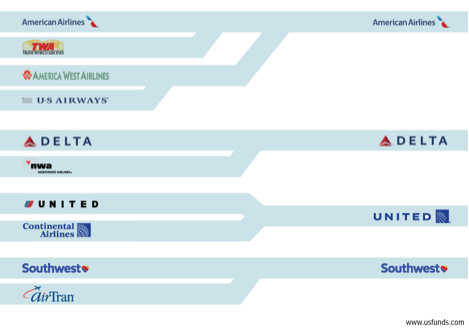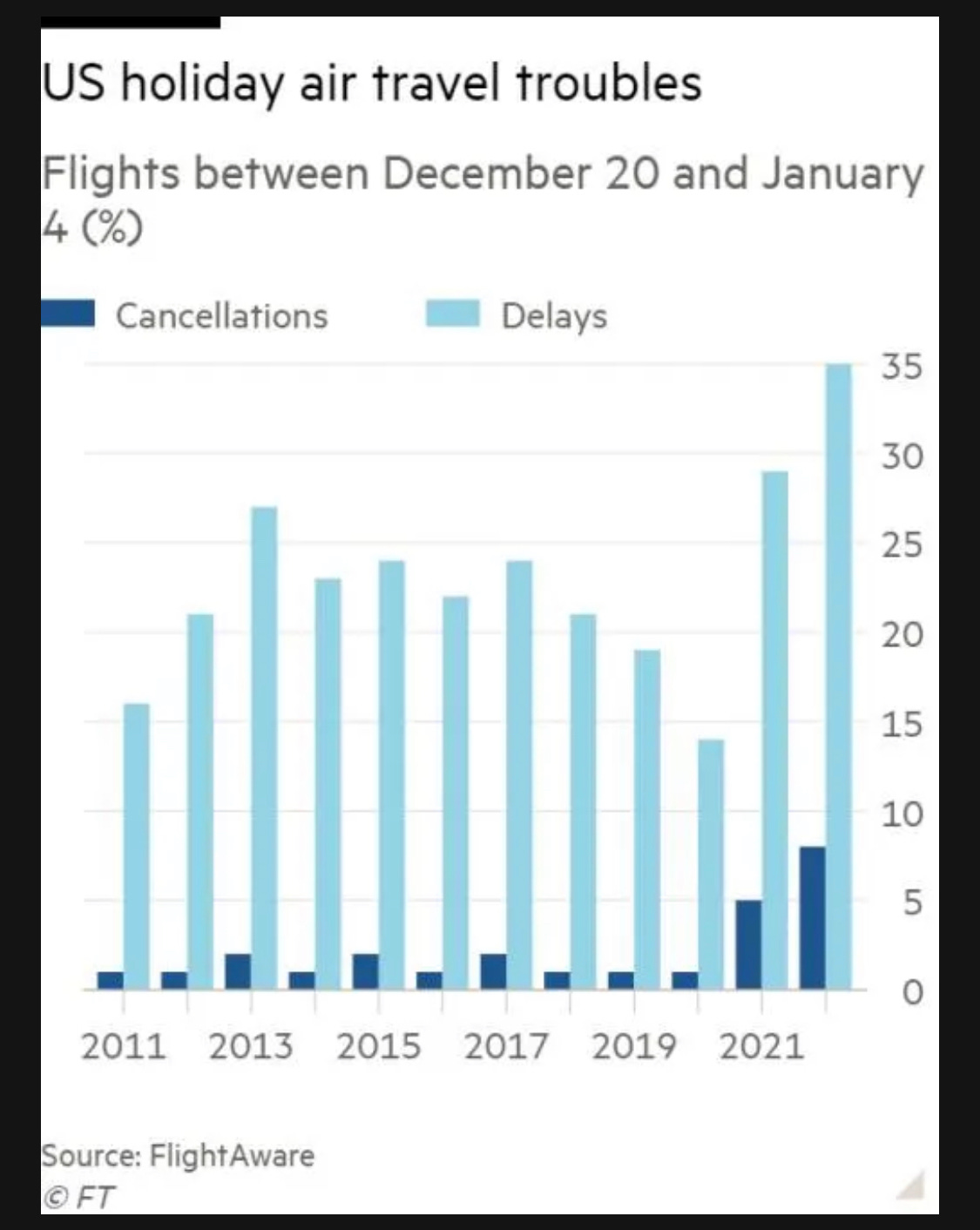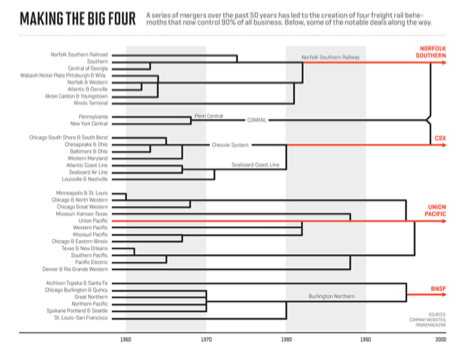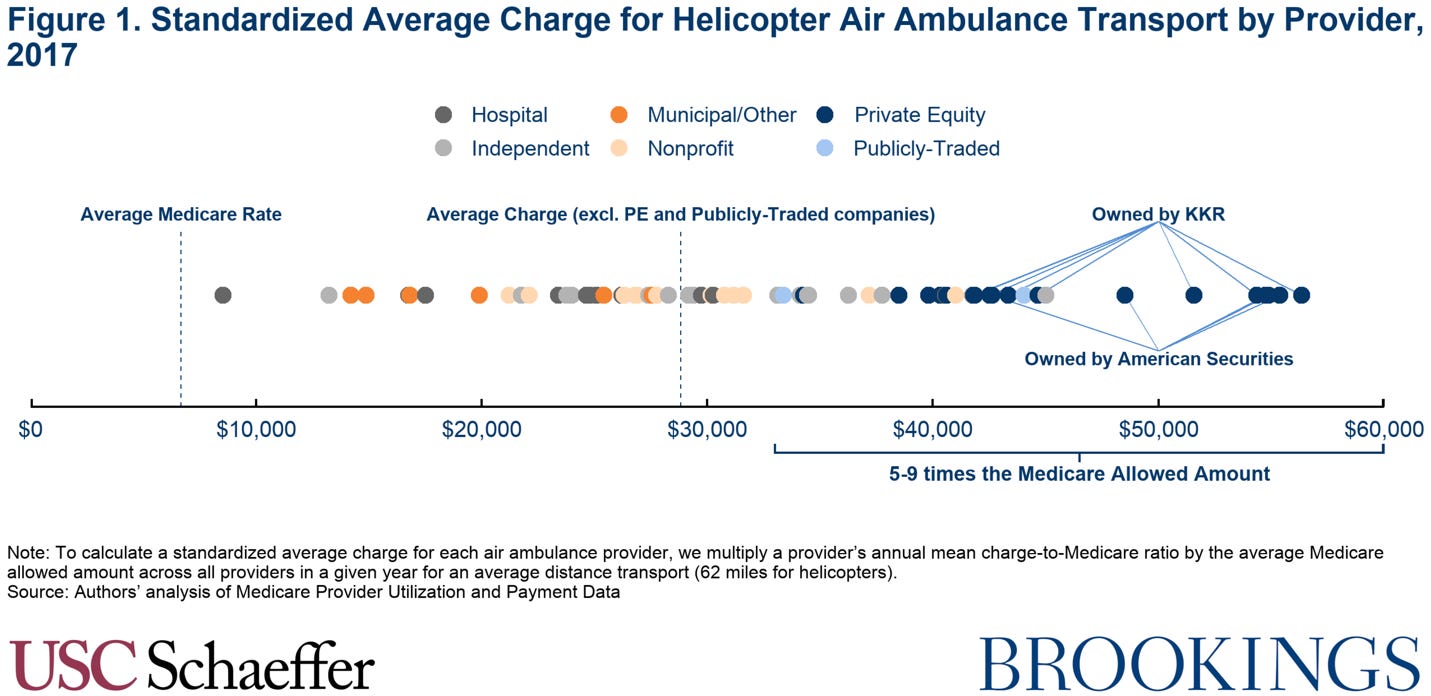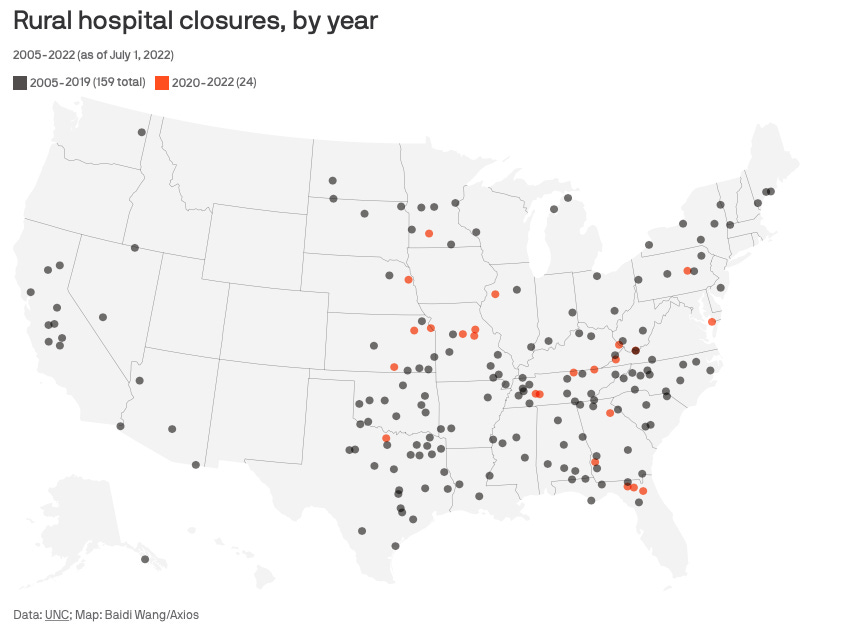The Origins of the Southwest Airlines Fiasco
Widespread airline cancellations over the holidays aren’t due to winter weather or computer system glitches, they are part of the growing evidence that our government has forgotten how to govern
Tl;dr
· The widespread Southwest Airlines delays and cancellations over the holidays are part of a broader trend of system crashes, ranging from the airlines, to supply chains, to the US healthcare system
· Many of these issues can be traced to free market reforms going back fifty years called neoliberalism
· The airline industry was deregulated in 1978 and has recently performed very poorly
· Supply chain issues during the pandemic can be traced to neoliberal reforms
· The US healthcare sector is a crisis waiting to happen
· To address these deficiencies, we need a New Progressive Age
America seems to be experiencing widespread systems degradation in the 2020s. Like your old computer after being bogged down with advertising popups and spyware, things that used to run smoothly seem to be slow and crash unexpectedly. Take air travel as an example. Over the holidays, millions commence a great airborne migration to see their loved ones. Despite employing multiple meteorologists, Southwest Airlines was caught off guard by winter weather and cancelled thousands of flights stranding untold numbers across America.
Southwest canceled nearly two-thirds of its flights Tuesday, Wednesday and Thursday, as part of an effort to dig out from a cascading meltdown after last week’s severe winter storm threw operations into disarray.[i]
Figure 1: Southwest Airlines flight cancellations Christmas 2022[ii]
This was a fiasco on an epic scale that captured media headlines and probably affected someone you know. Other things in America have also been breaking. In the middle of writing this article, a computer glitch affected the FAA causing all flights to be grounded nationwide. The near-rail strike and clogged shipping container ports are examples of our supply chain systems crashing. Your local emergency room doctors, ambulance services, and even 911 systems are increasingly owned by financiers in New York, unaccountable to their community and declining in effectiveness. There are many more examples of systems that worked in the 1980s but not the 2020s, despite our collective ability to order a burrito and have it delivered to our doorstep in twenty minutes. The common denominator to all these cascading crises is the dogmatic pursuit of free markets by both political parties over the last five decades. In the hunt for more efficient markets, our government has forgotten how to govern.
How We Got Here
The 1970s were a time of sluggish growth, an energy crisis, and sky-high inflation – not unlike today. In order to kickstart economic growth, policymakers were willing to try anything. An answer emerged from academia: radical deregulation and privatization. Some call this neoliberalism, which the AI ChatGPT defines as:
Neoliberalism is an economic and political ideology that emphasizes free market principles and policies, such as deregulation, privatizing state-owned industries, and reducing government intervention in the economy. It emphasizes the importance of individual liberty and limited government, and the belief that the market is the most efficient mechanism for allocating resources. The term "neoliberalism" is often used to describe the economic policies that have been adopted by many countries since the 1970s, which have included a reduction in tariffs, the deregulation of industries, and the reduction in the size of government. Neoliberal policies have been associated with globalization and have been credited with increasing economic growth and reducing poverty, but have also been criticized for increasing inequality and exacerbating social and economic problems.[iii]
We think of President Raegan deregulating and privatizing the economy, but it actually started in the 1970s under President Carter. The trend has lasted through Democratic and Republican Administrations alike until today.
Airline System Error
From the beginnings of commercial air travel in the 1920s, the government regulated the industry as a public utility. There were profitable routes to and from major cities (e.g. NYC to LA) but also unprofitable regional routes (e.g. Wichita to St. Louis). These unprofitable routes were required to be flown by the regulator and helped the economies of smaller cities.
Then in 1978 Congress deregulated the airlines in order to improve efficiency and reduce fares for customers. The unprofitable routes were cut and there was intense competition for the major routes. This ruinous competition resulted in a price war for the routes which greatly benefitted consumers but made the airlines fragile and structurally unprofitable. As a result, the industry became characterized by frequent bankruptcies and cyclicality. To survive, airlines consolidated and began to act like cartels, divvying up routes.
Figure 2: Airline consolidation[iv]
To make themselves more profitable, they cut costs and drove relentlessly towards greater efficiency. They cut staff until they had the minimum number necessary to operate. They focused on how quickly they could turnaround a plane at the gate. They overbooked flights to ensure they were full. They reduced seat sizes until they reached the limits of the human femur.
At the same time, their designated government overseer the Department of Transportation (DOT) went from protecting customers to protecting the airlines. Because of the industries’ fragility and frequent bankruptcies, the DOT came to see itself as protector of the industry instead of maintaining a healthy adversarial relationship. It gradually stopped enforcing its own rules, including requiring that a ticket be refunded in cash if the airline cancels a flight.[v] Figure 3 shows the decline of enforcement actions through the Obama and Trump Administrations. The trend has continued in 2020-22 under the Biden Administration despite historically bad performance.[vi]
Figure 3: DOT enforcement actions
Then COVID-19 hit and air traffic plummeted. The government gave airlines a $54 billion bailout on the condition that recipients of the funds maintain capacity (i.e. don’t lay off staff). The airlines then encouraged employees to take early retirement in order to cut costs. When passengers came back in 2021, airlines were understaffed. Today, airlines are fragile, unable to cope with disruption, and poorly regulated. The Southwest Airlines debacle over Christmas 2022 wasn’t a one-off event, but rather the culmination of a trend caused by many years of poor governance.
Figure 4: Holiday flight delays and cancellations[vii]
Supply Chain Cataclysm
The US also experienced widespread, long-lasting “supply chain issues” during the COVID-19 pandemic. We are told this was due to the once-in-a-century pandemic, but without going into all the details both the railroads and ocean shipping have gone through the same process of deregulation and consolidation as airlines over the past fifty years. This has made each extremely fragile. The railroads were deregulated with the Staggers Rail Act of 1980[viii]. Over-zealous industry cost-cutting was partly responsible for the near-rail strike late last year. The ocean shipping industry was deregulated by the Ocean Shipping Reform Act of 1998[ix]. Congress addressed some regulatory gaps in the sector last year with the Ocean Shipping Reform Act of 2022[x] but its too early to judge the results.
Figure 5: Freight railroad consolidation[xi]
The Next Crisis
So far, the industries affected by poor government oversight have only ruined Christmas and delayed our stuff; inconvenient but survivable. The next crisis might not be: US healthcare. To repurpose a phrase used to describe the banks after the 2008 financial crisis, there is a Vampire Squid feeding on our healthcare system. Financial actors (mostly private equity) are buying up emergency rooms, ambulance services, and even 911 systems.
Private equity (PE) owners make money by increasing prices on customers who usually don’t have other options in a health emergency. See one example from a PE-backed ER:
In one case cited in a lawsuit filed in Tennessee last year, TeamHealth allegedly demanded $1,712 for treating a 23-year-old man who walked into a hospital at midnight complaining of epigastric pain after eating a chilli dog. Court documents state that the patient was given an antacid and sent home.[xii]
Data are difficult to come by but a Financial Times investigation found that 25% of Texas ER doctors are employed by PE.[xiii] Data also show that air ambulances owned by PE are significantly more expensive than non-PE backed peers (5-9x more than Medicare reimburses).
Figure 6: Air ambulance costs[xiv]
140 rural hospitals have already closed since 2010.[xv] Excellent investigate journalism on the topic of PE hospital ownership has been conducted by Bloomberg, ProPublica, and CBS. And the Federal Reserve’s raising of interest rates to tame inflation will threaten PE’s business model (using cheap debt to buy hospitals), making this an imminent crisis. Left unchecked, it will lead to more hospital closures, higher healthcare costs, and worse health outcomes. This is part of the reason the US spends $4 trillion on healthcare per year (20% of our GDP, 3x peers) but gets worse health outcomes.
Figure 7: Rural hospital closures[xvi]
Bringing an End to The New Gilded Age
There was a reason these industries were deregulated in the 1970s and Ad Astra is not advocating for a state-planned economy. A continuum exists between unfettered capitalism and communism, and the US must strike the right balance. Like any board game, capitalism requires rules. To address the issues in this post, Congress should pass sensible regulation reforming the airline and railroad industries. Congress should also immediately investigate PE ownership in healthcare and pass sensible reforms to keep Americans healthy.
Ad Astra and many others have called our era the New Gilded Age due to numerous similarities with the Gilded Age in the late-nineteenth century. Like then, our age is characterized by monopolies, unfettered capitalism, and worker exploitation. That era was followed by the Progressive Age, when the federal government broke up the monopolies, introduced sensible regulation, and protected workers. The Progressive Age was brought about by journalists, called muckrakers, who used investigative journalism to shape public opinion.
Today, we need a new generation of muckrakers and a New Progressive Age. Hopefully platforms like Substack and Twitter will empower digital muckrakers.
Author’s note: on an unrelated and less lofty note, Ad Astra has started a recommendations page here. We’ll keep an ongoing list of Ad Astra’s favorite books, podcasts, articles, TV shows, and movies.
[i] https://www.wsj.com/articles/southwest-airlines-resumes-ticket-sales-prepares-to-resume-regular-flights-friday-11672335336?mod=Searchresults_pos3&page=1
[ii] WSJ
[iii] ChatGPT
[iv] www.usfunds.com
[vii] FT
[viii] https://uslaw.link/citation/us-law/public/96/448
[x] https://www.congress.gov/117/plaws/publ146/PLAW-117publ146.pdf
[xi] https://topforeignstocks.com/wp-content/uploads/2018/10/US-Railroad-Merger-History.gif
[xii] https://on.ft.com/3HOQvA8
[xiii] https://www.ft.com/content/5673a288-f55b-4cfd-aa76-0ebb30b029a6?shareType=nongift
[xiv] https://www.brookings.edu/blog/usc-brookings-schaeffer-on-health-policy/2020/10/13/high-air-ambulance-charges-concentrated-in-private-equity-owned-carriers/
[xvi] https://www.axios.com/2022/07/14/rural-hospitals-face-financial-jeopardy

